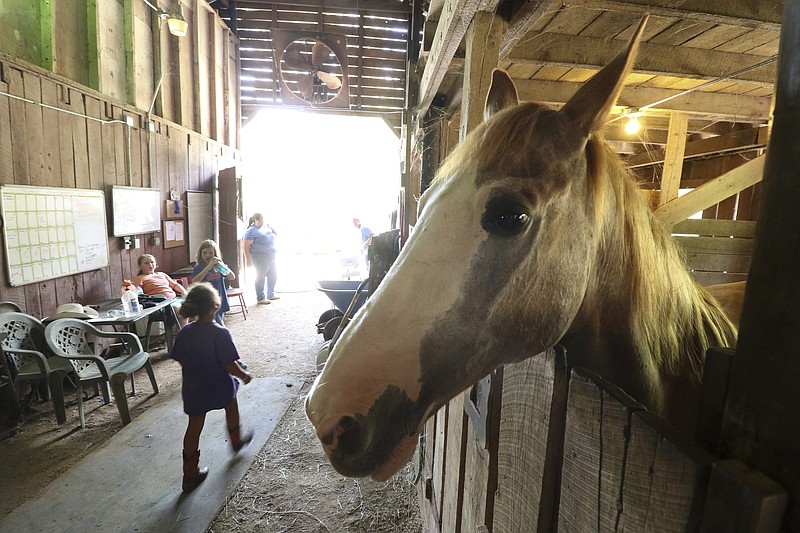Agriculture officials in Alabama have issued a notice to horse owners to vaccinate their animals for West Nile virus and Eastern equine encephalitis after a Georgia horse recently tested positive for one of the mosquito-borne diseases.
A horse from Georgia that arrived at Auburn University's College of Veterinary Medicine for treatment tested positive for Eastern equine encephalitis, known as EEE, officials said. On top of that, the Mobile County (Ala.) Health Department has reported that sentinel chickens used to detect mosquito-borne diseases in the community have tested positive for the disease.
"Unfortunately mosquito-borne viruses like EEE and West Nile virus are prevalent in Alabama's warm and wet climate," Alabama Agriculture and Industries Commission John McMillan said in a warning statement to horse owners.
"I want to encourage horse owners to take precautionary measures and vaccinate their horses," McMillan said.
Eastern equine encephalitis is the more dangerous of the two mosquito-borne diseases, officials said. The mortality rate for West Nile in horses is about 30 percent, while the mortality rate for EEE is almost 90 percent. Both can make humans sick but are rarely fatal.
In horses, the encephalitis causes inflammation or swelling of the brain and spinal cord and symptoms that include central nervous system convulsions, lack of response to facial stimulation and a high fever.
Georgia Department of Agriculture spokeswoman Julie McPeake said there are no outbreaks in Georgia, but officials in Atlanta are aware of some scattered cases.
"We are aware that these viruses are out there. We have not made any formal recommendations," McPeake said Monday. She said there was nothing wrong with Georgia horse owners vaccinating their animals anyway, though.
Tennessee agriculture officials also have not issued official recommendations or reported outbreaks in 2017, but spokeswoman Corrine Gould said officials always encourage preventative measures.
Likewise, Alabama's McMillan and Alabama State Veterinarian Dr. Tony Frazier recommend that horse owners vaccinate their horses every six months against EEE and West Nile virus. Frazier and McMillan also recommend that humans take steps to limit their exposure to mosquitoes.
"Vaccinating is important to protect horses and ourselves," McMillan said.
For humans, the U.S. Centers for Disease Control and Prevention in Atlanta recommends using an insect repellent containing either DEET, Picaridin, IR3535, oil of lemon eucalyptus or para-menthane-diol or 2-undecanone to keep mosquitoes away.
Steps also can be taken at home to limit mosquito exposure by removing standing water where mosquitoes can lay eggs and using insecticides outside to kill them in dark, humid areas where they rest, according to the CDC.
Contact staff writer Ben Benton at bbenton@timesfreepress.com or 423-757-6569. Follow him on Twitter @BenBenton.
Symptoms
Eastern equine encephalitisThe disease primarily affects young, unvaccinated or under vaccinated horses.Symptoms in horses occur one to three weeks following infection, beginning with a fever which may reach as high as 106 degrees F. This fever usually will last from 24 to 48 hours. During the fever nervous signs appear that include sensitivity to sound, periods of excitement and restlessness.Brain lesions may appear, causing drowsiness, drooping ears, aimless wandering, head press, inability to swallow, among others. Paralysis follows, causing the horse to have difficulty raising its head. The horse usually is completely paralyzed and dies two to four days after symptoms start. It’s estimated that nine out of every 10 horses infected with EEE virus die.West Nile virusThe virus requires a host — birds in West Nile’s case — and mosquitoes become infected when they feed on infected birds.Following a bite by an infected mosquito, the virus multiplies in the horse’s blood system, and crosses into the brain, where it infects the brain, causing inflammation and interference with the central nervous system. Clinical signs of the disease in horses include fever, stumbling and tripping, muscle weakness and twitching, partial paralysis, inability to stand, convulsions and coma. The virus is fatal to about 30 percent of horses that become infected.Source: Georgia Department of Agriculture
